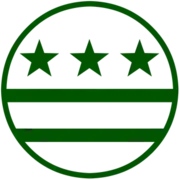D.C. Statehood Green Party
The D.C. Statehood Green Party, known as the DC Statehood Party prior to 1999, is a green progressive political party in the District of Columbia. The party is the D.C. affiliate of the national Green Party but has traditionally elevated issues of District of Columbia statehood movement as its primary focus. Party members refer to the Statehood Green Party as the second most popular party in the District because, historically, STG (on the D.C. electoral ballot) candidates win the second highest vote totals in the city, ahead of the Republican Party but behind the Democratic Party.[2] As of February 2023, there are approximately 4,140 voters registered in the Statehood Green Party, or 0.79% of registered voters in the city.[3]
D.C. Statehood Green Party | |
|---|---|
 | |
| Chairman | Darryl LC Moch |
| Preceded by | DC Statehood Party |
| Headquarters | Washington, D.C. |
| Membership (2023) | 4,140[1] |
| Ideology | Green politics Progressivism D.C. statehood |
| National affiliation | Green Party of the United States |
| Colors | Green |
| D.C. Council | 0 / 13 |
| Website | |
| Official website | |
| Part of a series on |
| Green politics |
|---|
.svg.png.webp) |
History
The party was founded to convince Julius Hobson to run for the District's non-voting Congressional Delegate position as a member of the D.C. Statehood Party.[4] Although Hobson lost that race to Walter E. Fauntroy, Hobson received enough votes to make the party an official major party in the District.[5] Following the election, Hobson helped set up the party in the District.[6] Other notable founders include Josephine Butler and Calvert I. Cassell.[7] The party was organized on the ward level, and ward chairs could decide how to organize their activities in their wards.[6] Hobson later served on the D.C. Council. In 1973, the party was a strong proponent of the District of Columbia Home Rule Act, which gave limited self-government to the District. From the creation of the District Council in 1975 until 1999, the party always had one of the at-large seats, first occupied by Hobson and then by Hilda Mason.
In 1998, a Green Party was founded in D.C. Their candidate for Shadow Representative, Mike Livingston, ran that year. He received 2,000 more votes than necessary for the party to qualify for continued ballot access. In October 1999, the new Green Party merged with the longstanding and larger Statehood Party to form the Statehood Green Party.[8]
In a 2016 district-wide plebiscite, D.C. residents voted in favor of statehood. The party criticized the lack of involvement of regular citizens in the process.[9][10]
References
- Winger, Richard. "DC Board of Elections, Voter Totals for February 2023". DC Board of Elections. Retrieved March 18, 2023.
- Sherwood, Tom (2006-11-29). "What's Old Is New Again ... At RFK?". NBC4.com. Archived from the original on May 17, 2007. Retrieved 2008-07-31.
{{cite web}}: CS1 maint: unfit URL (link) - "Monthly Report of Voter Registration Statistics as of February, 2023 Archived April 23, 2016, at the Wayback Machine" District of Columbia Board of Elections. February 2023.
- Prince, Richard E. (January 15, 1971). "Hobson Jumps Into Delegate Contest: Hobson to Run for Delegate as an Independent". The Washington Post. p. A1. ProQuest 148041613.
- "Walter Fauntroy and the People". The Washington Post. March 25, 1971. p. A20.
- Brandon, Ivan C. (March 29, 1971). "Hobson and Supporters Map Third Party Plans". The Washington Post. p. C2.
- Levey, Jane F. (2021-06-16). "Charles I. Cassell, 1924-2021". DC History Center. Retrieved 2022-11-05.
- "Ballot Status History: D.C. Statehood Green Party". Green Party of the United States. Retrieved 26 January 2021.
- "DC Voters Elect Gray to Council, Approve Statehood Measure". NBC Washington. 8 November 2016. Retrieved 4 January 2017.
- McDermott, Ryan (27 September 2016). "DC statehood advocates say council is rushing process, leaving out citizen voices". The Washington Times. Retrieved 4 January 2017.